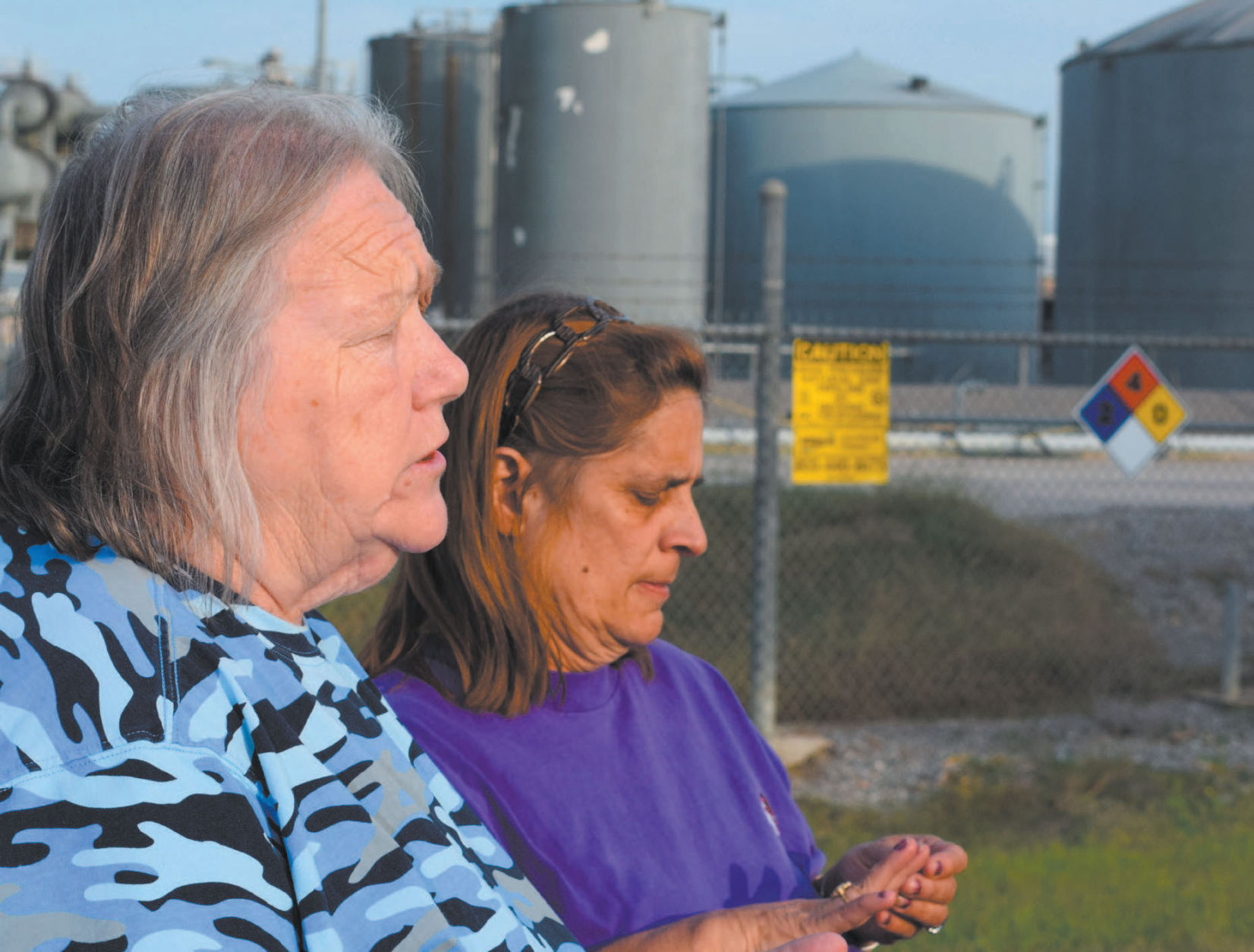
Chatman honored by peers
October 20, 2015
Fisherman’s friend
October 21, 2015Residents of the handful of trailers and houses alongside the gravel roads that flank the Williams Pipeline Company in Gibson have long shared an uneasy existence with their industrial neighbor.
The gas-work’s tentacular spread of tubes, pipes, valves, stanchions and tanks hisses and clunks, occasionally breathing fire during scheduled burn-offs, leaving a distinct question, neighbors say, not of if but when something might go wrong.
The question was answered at about 11 a.m. on Oct. 8, with a loud boom and belching black smoke from a fire that turned a routine maintenance event into a tragedy that claimed four lives.
The Louisiana State Police, the federal Pipeline Hazard and Safety Administration and the Occupational Safety and Health Administration are still investigating, and the cause has not yet been determined.
The fatalities were identified as Sam Brinlee of Berwick, who was 40-years-old and Casey Ordoyne, 36, of Larose; Jason Phillipe, 37, of Robertson, Ill. and Michael Hill, 56, of Paris, Tenn.
All four worked for contract firms that supply skilled oil-and-gas labor, Brinlee and Ordoyne for DanosinGray; Phillipe and Hill for Furmanite in Geismar.
Brinlee, Ordoyne and Phillippe were declared dead at the scene. Hill died Oct. 12 at University Hospital in New Orleans. Another Furmanite worker was critically injured but his condition could not be determined, and his identity has not been released.
“All over it came, the fire was there, then the smoke, and then there were helicopters, oh my God,” said Julie Eymard, who lives in a mobile home due west of the Williams plant, steps from its chain-link fence.
Eymard has only lived there for a month or so. She wasn’t afraid at first, but now she worries.
The couple she lives with, Elaine and Michael Robicheaux, have slept with one ear trained to the Williams station night for 22 years. Since the explosion, they said, they have experienced some coughing and their dogs, a rat terrier and a Jack Russell, vomited for three days afterward.
“I was so confused when it happened, I didn’t know what to even think,” said Elaine Robicheaux, who left with her husband and dogs, waiting it out at a convenience store about five miles away “There is nothing going on right now but once the plant starts up again definitely I will be worried.”
The realization that comes when a sleeping dragon awakens breathing fire is familiar to local environmental advocates.
“The continued repetition of this tragic history makes it seem as though we have silently agreed to sacrifice the health and safety of communities for business and economy,” said Michael Orr, spokesman for the Louisiana Environmental Action Network. “There does seem to be a perspective that this risk is a sacrifice we must make for the benefits of these industries. But what are those benefits? Are they worth it and since when has life and health been an acceptable trade off for any industry?”
Representatives of the $74 billion Louisiana oil and gas industry point to the crucial nature of its 300,000 jobs. Chris John, president of the Mid-Continent Louisiana Oil and Gas Association, note health risks related to the burning of sugar cane fields as an example.
“There are risks involved in anything we do on a daily basis, be it farming, manufacturing or oil and gas activities,” John said. “But as far as oil and gas, safety is the number one concern on all of my members. To single out this industry as more volatile than others is not very fair.”
John and other industry spokesmen say the safety consciousness of the industry is what counts.
Emergency officials confirmed that health risks dissipated in Gibson when burning pockets of sludge related to natural gas drying were extinguished.
But what occurred as the fire was burning is a different matter.
Sharon Dupre, who lives east of the plant, said she was hospitalized at Terrebonne General Medical Center for seven days following the blast.
Already afflicted with chronic obstructive pulmonary disease, Dupre said she got unexpected doses of smoke when she and her husband, Wilson, stepped onto their porch to see what the commotion was.
“When I seen it coming toward me I told my husband oh s— it’s time for me to go inside,” Sharon Dupre said. “Right when I had walked outside it came our way”
“It was like the movie ‘The Fog,’ it was kind of creepy,” Wilson Dupre said.
“It was going the other way and then for some reason it shifted our way,” Sharon Dupre said.
Wilson Dupre hustled his wife off to Terrebonne General Medical Center in their F-150 pickup when she began having trouble breathing.
“She was getting pale,” Wilson Dupre said.
He returned to Gibson to pick up clothes and was met by a Williams employee, who said hotel rooms were available for anyone living close to the plant who needed or wanted one.
“I told them my wife already had a room at the hospital,” Wilson Dupre said.
The Dupres have long been concerned about their proximity But they bought their land at a good price, they say, and the benefits appeared to outweigh the risk.
The day Sharon Dupre was released from the hospital a company representative showed up with papers for her to sign.
“The company said they have to pay my insurance company and have to get some forms,” Sharon Dupre said.
Wilson Dupre, who worked in the oilfield for many years until an employment-related injury consigned him to disability status, is fairly certain the papers relate to records releases, but not entirely
“I don’t read so well,” he explained.
Williams has been a good neighbor, according to the Dupres and others who live nearby If some operation related to the plant might cause extra noise or some other inconvenience, notice is usually given.
The Oct. 8 incident was part of a pipeline maintenance shut-down that began Oct. 4 and was scheduled to continue through Oct. 12. The re-opening has not yet occurred. The Dupres and the Robicheauxs say they received no notification of the work begun Oct. 4, although Christopher Stockton, a Williams spokesman, said notifications were made.
He confirmed that neighbors such as the Dupres were contacted by the company
“We followed up with adjacent neighbors multiple times, both immediately following the incident and days afterwards,” Stockton said. “Our goal is to treat our neighbors with respect. There is nothing more important to us than the safely and well-being of our employees and neighbors.”
The Dupres said they expect a Williams company man to return this week with more papers to sign. They have not contacted an attorney for advice and say they are not likely to do so.
“I really don’t want to have to involve an attorney if I don’t have to,” Sharon Dupre said. “I don’t want no trouble.”
The Dupres are now more mindful than ever that things can go wrong on the other side of the chain-link fence.
“You always do have that little inkling in your mind,” Sharon Dupre said. “Now I don’t even like to look that way”
Elaine Robicheaux (at left) and Julie Eymard both live steps away from the Williams Pipeline compression station in Gibson where four workers were killed on Oct. 8. They are among the plant’s neighbors expressing concern about living so close to the site.
The Williams Pipeline compression plant on La. 182 in Gibson, viewed from a gravel road west of the facility. An Oct. 8 fire at the plant claimed the lives of four workers. Shut down for maintenance Oct. 4, the plant was scheduled to reopen Oct. 12 but now remains closed.











